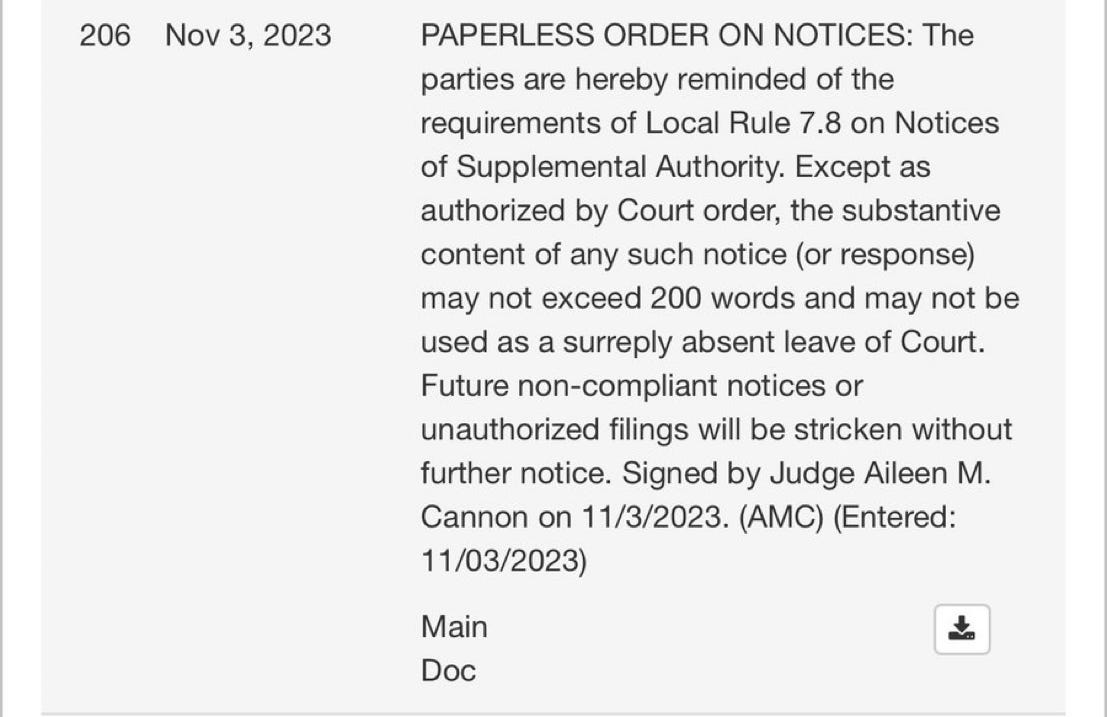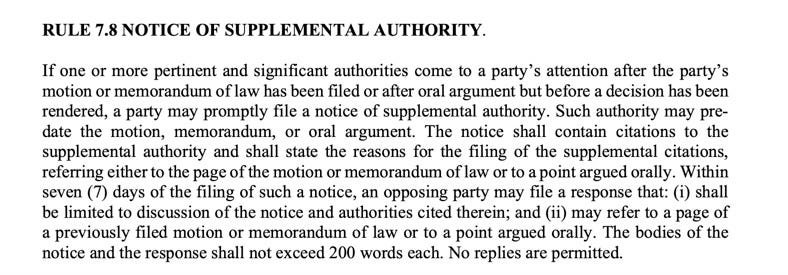Judge Cannon's Response
Thursday night, prosecutors alerted federal Judge Aileen Cannon in Southern Florida that after Trump’s lawyers asked her to delay his trial there because it was too close in time to his trial in the District of Columbia, they turned around and asked the Judge in D.C. to delay the trial there as well. I wrote that night that I wondered whether Judge Cannon, who has been so unstinting in her criticism of prosecutors, might have some to spare for Trump's lawyers now.
But she did not. Instead, she chastised prosecutors for violating local rules. She didn’t show any concern about the Trump lawyers’ failure to advise her of the motion they’d made in D.C..
In my experience—25 years as a federal prosecutor and six years in private practice before that—judges get worked up about this kind of thing. Lawyers have a duty to be candid with the court and failing to disclose material facts, for instance, that you’re about to ask the judge to move the trial you say will conflict in time with yours, violates that duty of candor. Judges take it seriously. At least, most judges do.
So far, Judge Cannon doesn’t seem to be. In fact, she has already given Trump additional time to file his pretrial motions, after indicating in court she was inclined to delay the trial. She noted in a minute entry: “pre-trial deadlines temporarily stayed pending order to follow.”
In her written order, Judge Cannon reprimanded prosecutors for alerting her to the Trump camp’s efforts to delay the D.C. trial. Relying on Local Rule 7.8, she wrote, “[e]xcept as authorized by Court order, the substantive content of any such notice (or response) may not exceed 200 words and may not be used as a surreply absent leave of court.” "Future non-compliant notices or unauthorized filings will be stricken without further notice." (A surreply is an extra reply to a motion after all the responses permitted under the rules have already been filed.)
But Local Rule 7.8 doesn’t clearly apply to the notice filed by the prosecution. It reads as follows:
Notice that it’s entitled “Notice of Supplemental Authority.” “Supplemental authority” is lawyer talk for case law—pertinent written decisions made by a court after the lawyers have filed their briefs or argued their case in court, or (God forbid) that a lawyer has missed when writing their brief and comes, hat in hand, to advise the court of. In the for what it’s worth category, good lawyers will advise the court of supplemental authority whether it’s in their favor or not, and when it’s not in their favor, will attempt to use their limited allotment of words to distinguish it from the case they are arguing. But “supplemental authority” means providing the court with a judicial opinion the lawyer cites to.
This is a concept that should be familiar to Judge Cannon, since there is a similar provision in Federal Rule of Appellate Procedure 28(J):
That rule too speaks of “supplemental authority”. Before going on the bench, Cannon was an appellate litigator in the U.S. Attorney’s Office in the Southern District of Florida and would have undoubtedly been familiar with the rule as that office uses it not infrequently.
So, it’s not clear, it’s not even likely, that the prosecution’s effort to gently advise the Judge of a pertinent fact the other side failed to disclose falls within the rule the Judge cited. There was no reason for the prosecution to believe the rule, and its strict word limits, applied to them. The Judge’s response indicating displeasure only with the government, whose filing ran to just over 200 words in any event, is overboard. She acted as though prosecutors had committed a major offense, rather than trying to set the record straight when the defense failed to do so. Perhaps the Judge believes it would better to litigate in a world where parties are afraid to bring deception to the court’s attention for fear of being sanctioned? That is not how the American system of justice is supposed to work.
A more balanced judge might have advised prosecutors she treated submissions like theirs under the local rule. She could have directed them to comply with it in any future filings, or even to remove the offending number of words in their submission to bring it down under 200. A more balanced judge might even have thanked the prosecution for bringing this new fact to the court’s attention and asked the defense to respond. This judge did not.
Perhaps Judge Cannon needs to remember what this case is about: alleged crimes regarding the treatment of highly classified documents by a former president—allegations that are backed up by evidence collected during execution of a court-ordered search warrant. Instead, it seems to have devolved into an inexplicable grudge match with the Special Counsel’s office on her part.
Judge Cannon could take “judicial notice” of Trump’s motion to continue the D.C. case. Surely she had seen, or someone brought to her attention the motion to continue he had filed in the other court. The Special Counsel’s office chose to bring it to her attention with the request that she not permit Trump to manipulate the court. Perhaps she bristled at the suggestion she was being manipulated. Perhaps she will consider Trump’s motion in D.C. when she rules on his motion to continue the trial in her court. But her response was a gross overreaction to a simple, well-warranted notice filed by the government. No one threatened her with death or attacked her clerk. The government was simply trying to make sure the court had all of the facts relevant to a decision it has to make at hand.
The reality is that Judge Cannon lacks the temperament to be a federal judge, at least in a case involving the man who put her on the bench. Perhaps she wants to avoid displeasing people whose support she thinks she may need in the future. Perhaps she would have ruled this way in any event. But it’s clear that, like the earlier rulings that caused the 11th Circuit to tell her to stand down, she is handling this case in a manner that deprives reasonable people of the belief she is a fair and neutral arbiter.
Jack Smith may well regret toughing it out instead of seeking to recuse Cannon straight off the bat when he had the opportunity.
We’re in this together,
Joyce






Wondering silently if Smiths team is quietly collecting data on Judge Cannon and planning to go to the circuit court to look for relief sometime soon.
Joyce Vance has taken Judge Aileen Cannon to task in the most legal of ways. Rarely, if ever, do we have the opportunity to learn the scope of a judge's knowledge and responsibilities when making rulings. Thank you for this expert lesson about the judiciary, as expressed in 'Judge Cannon's Response.